All babies cry. However, if your baby seems to cry more frequently, more intensively and for longer periods than you would like (or can bear, for that matter), you might be abl to figure out the reason by asking yourself the following questions.
Question # 1: Is baby uncomfortable?
A: Change baby’s nappy if it’s wet or soiled. If you see red spots on baby’s bottom, it’s most likely nappy rash. Remove her nappy, clean her up and let her go bottomless for a day or so. Bring her to the doctor if the rash persists.Feeling too cold or too hot can also make baby cry. If she’s hot and sweaty, dress her lightly. If her skin feels cold, warm her up with another layer of clothes or swaddle her in a blanket.
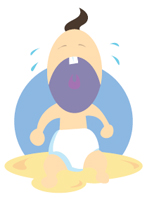
Question # 2: Is baby in pain?
A: Pain will surely make baby cry. In the days before disposable nappies, many a baby was accidentally pricked or poked by a wayward diaper pin. Disposable nappies are more popular nowadays but you should still check whether the rough edges at the flaps are giving baby a hard time.
Question # 3: Is baby hungry?
A: All babies cry when they’re hungry. If you haven’t yet learned to recognise baby’s “Feed me, I’m hungry” cry, try offering your breast; baby will suckle if she wants a feed.
Question # 4: Is baby in a bad mood?
A: Baby might be grouchy and protest when she’s woken up, bathed, dressed, wrapped and unwrapped in a nappy. Try restoring her mood by cuddling, singing to her or distracting her with a toy.
Question # 5: Is baby just being hard to please?
A: ‘Difficult babies’ tend to be strong-willed, easily irritated with changes, and cry a lot, as a result. If you have a ‘difficult baby’, be patient and try to bear with her when she gets cranky. If baby takes a long time to adapt to changes, she may be the ‘slow-to-warm-up’ type. Introduce changes slowly and give her time to adjust, while being ready to console her.You’re likely to have an ‘easy baby’ if she’s the type who stops crying almost as soon as you respond to her needs. If so, whenever the wailing starts, check on what she wants. It could be a cuddle, a feed or a nappy change.
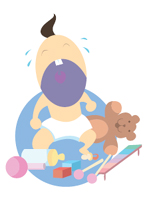
Question # 6: Is baby having a bout of colic?
A: If baby’s stomach is bloated or distended, and she is pulling up her legs and passing gas while screaming away for hours at a time (usually between 6.00 pm and midnight), she might be having colic. Up to 28 percent of babies get this condition, mostly during their 2nd to 6th weeks of life. As long as baby calms down within a few hours and is relatively peaceful the rest of the time, there’s no reason for alarm.
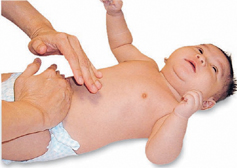
Colicky behavior rarely signals a medical problem (such as a hernia, intussusception or even urine infection) and has not been found to have any lasting effect on babies. It’s not easy to soothe baby when she is colicky but you should try to console her. Just keep telling yourself that these distressing bouts should end when baby reaches 3 months of age, as in 85 per cent of cases.
Question # 7: Is baby ill?
A: Baby will invariably cry if she’s feeling sick.You may be able to tell from her crying sounds because it’ll be different from usual. If baby develops a fever, vomiting or diarrhoea, take her to the doctor immediately.
CHECKING ON COLIC
- When baby gets colicky, try carrying her with her tummy against your chest, walking her in a body carrier, laying her tummy-down across your knees and gently rubbing her back, rocking her, or lulling her to a rhythmic sound.
- If baby’s colicky behaviour is making you worry, let your paediatrician rule out any medical reason for the crying.
- Carry baby about more during the day as it might lessen her colic and fussiness in the evenings, as studies suggest.
- If you smoke, quit. Researchers in Denmark have found that babies whose mothers smoked 15 or more cigarettes a day during pregnancy or after giving birth were twice as likely to have colic, as compared with babies of mothers who are non-smokers.
- If baby is breastfed, sensitivity to something that you ate could be bringing on the colic. Eliminate milk products, caffeine, onions, cabbage and any other potentially irritating foods from your diet. If food sensitivity is indeed causing the discomfort, the colic should decrease within a day or two of these changes.
- Do not give fruit juices to baby if she is younger than 6 months. Some babies aged 4 to 6 months with a history of colic are more likely to experience gas, fussiness and sleep disturbance after drinking apple juice and pear juice.
- Never ever shake your baby no matter how much her crying exasperates you. It can cause ‘shaken baby syndrome’ which involves bleeding in the brain, blindness or even death.
- If you feel at wits’ end with baby’s crying, leave your house for an hour or so until you are calm. Get someone to look after your baby while you cool down.
- If baby’s crying can drive you nuts, it can do the same to a nanny or maid. Be sure to advise your helper on the dangers of ‘shaken baby syndrome’.
MASSAGE FOR A MERRY BABY
Besides cuddling, rocking and patting, you can also give baby a regular massage to calm baby down. Massage has been shown to relax baby, not to mention relieve pain and improve digestion. It also enhances baby’s overall well-being by improving blood circulation while enhancing her absorption of nutrients and improving weight gain.

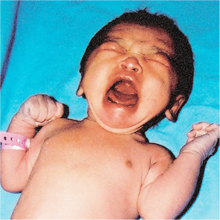



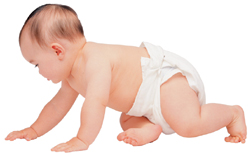

Comments